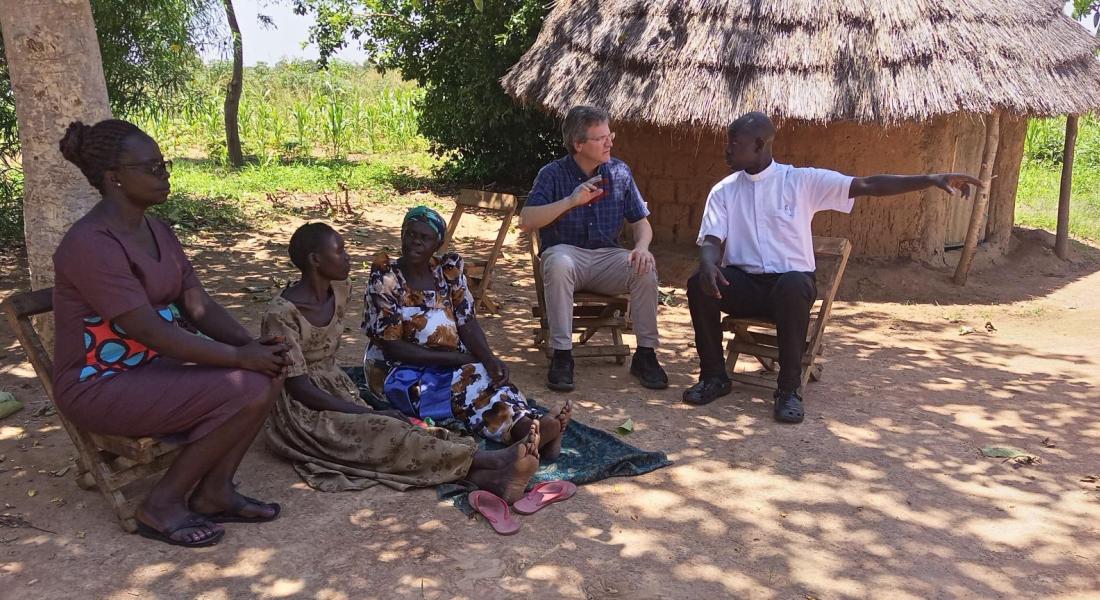
Uganda's social and economic environment can make primary education a challenge, especially in rural communities. Funding and support don't always meet the needs of students who, far too often, drop out of classes as a result.
This learning loss narrows the possibilities for individual children, but it also limits the future of entire communities and the African nation as a whole. That's why Kellogg Institute faculty fellow Joseph Kaboski, the David F. and Erin M. Seng Foundation Professor of Economics at the University of Notre Dame, and his colleagues developed a strategy to improve learning outcomes in rural schools.
Their research through the Ford Program in Human Development Studies and Solidarity, in partnership with Uganda's own Building Tomorrow educational nonprofit, examined the potential benefits of additional in-class assistants and community education volunteers to help teachers with class instruction, lesson plans, grading tests, student retention and more.
The Uganda research reflects the Ford Program’s commitment to projects that are informed and led by the communities they are meant to serve. Building Tomorrow Fellows who served as teaching assistants are young Ugandan university graduates with two-year commitments to support education transformation in rural village schools.
"These are low-cost models for increasing enrollment and test scores for students at critical ages, when students often fall behind and drop out," said Kaboski, whose team included scholars from Tufts University and Arizona State University, along with Notre Dame staff.
The research included a randomized controlled trial across 112 schools, analyzing quantitative data from fourth grade students' foundational literacy and numeracy test scores, and time-use data from teachers, in-class assistants, and community education volunteers. Researchers also conducted complementary qualitative interviews with school principals, teachers, volunteers, and NGO program staff to gain deeper insights into the intervention mechanisms and impact.
Findings reveal improvements in learning outcomes, enrollment rates, teacher pedagogical practices, and school community relationships, although treatment effects varied by program component. Results show that students receiving an additional trained staffer made 50 percent more progress in mathematics over the school year than those in the control group. Similarly, the number of students falling behind in mathematics was reduced by four percent in schools receiving additional trained fellows. Teachers who received an additional staffer spent 35 percent more time on one-to-one instruction with students than teachers in the control group and less time on administrative tasks. Moreover, the results show a positive effect on student enrollment, with additional college graduate assistants reducing disenrollment by about 21% and community education volunteers reducing disenrollment by 39%.
The study adds practical and theoretical contributions to educational governance by providing evidence of how a program that alleviates constraints on teachers can improve school enrollments and learning outcomes.
Maurice Sikenyi, assistant director of the Ford Program and co-principal investigator for the study, recently traveled back to Uganda to discuss next steps with project partners on the ground.
"This research demonstrates the importance of meaningful and long-term local partnerships in human development studies," said Sikenyi. “It offers a great opportunity for faculty and students to effectively examine complex challenges of our society, such as low student achievement and high drop-out rates, with evidence that can inform policy actions."
The Kellogg Institute for International Studies, part of the Keough School of Global Affairs at the University of Notre Dame, is an interdisciplinary community of scholars and students from across the University and around the globe that promotes research, provides educational opportunities, and builds partnerships throughout the world on the themes of global democracy and integral human development.





